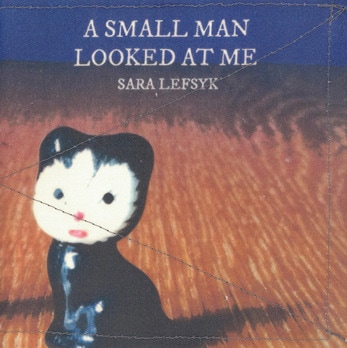Review: A Small Man Looked at Me

A Small Man Looked At Me by Sara Lefsyk
Book: hand-sewn, fabric cover, chapbook
Publisher: Little Red Leaves Textile Series (Fall 2014)
Purchase: Available at LRL Textile Series
Review by Annmarie O'Connell
Sara Lefsyk’s second chapbook, A Small Man Looked At Me, reads like limbic consciousness in a series of twelve prose poems of both exploration and lineage. The poems themselves are poems of transformation as we witness the speaker and small man on a daring journey of the agonizing work of self. So what does the speaker and man learn? What does the speaker wish for us? A birth family. Iraqi wives. Beard hairs of small ghosts. Lefsyk writes:
And still, after all these years, it feels as if I’m not born and no matter what shoes I wear I still cannot get my feet to touch the ground.
The past moves and molds us. Lefsyk seemingly creates an extremely powerful, bitterly nostalgic emotional suffocation for the reader as nothing and everything is happening all at once for the speaker and man. They are getting by and barely stagnant in their own personal darkhouses. Subsequently so are we. And to get out? The speaker assures us, “I never wanted to become a night nurse anyway." The speaker and man are translations of memory and dream as they recover themselves in a sterile, commercialized existence. Maybe something of the past. Perhaps the ultra explosive moment in the book comes when Lefsyk’s unmatched gift to remind the reader of his or her own fleeting moments, time spilling over and out of our bodies like the sea. Lefsyk’s poems build up like a surreal time bomb and it’s really happening. Here:
Sometimes it is as if I am carrying the weight of all seas of all time that ever existed.
What is this weight made of? A recent diagnosis. The reader is told, “a five year battle with a great and heavy tiredness.” The humanity in Lefsyk’s poems is what makes them decidedly most incredibly beautiful as the speaker finds it in her wondrous heart to ask the man: “Would I make it through I wondered?” Well, will we? Any of us? In a moment of sheer relief the old man assures us by bringing a “nice feather blanket out of all these birds circling.” So what is the man? He is love. Unwavering, sacrificial near perfect love:
He took his shotgun and went outside and began shooting all the hundreds of birds and defeathering them and stuffing the feathers into a nice cotton fabric even though he was allergic to down.
Reading Lefsyk’s book reminds us of our personal journeys as we move backwards then forward on them as the speaker and old man show us how to be in the world for each other even in utter pain, even with all that is laid out for us in our separate, devastating lives. Lefsyk tells us what to do about right now. Lefsyk’s poems are everything we ever wanted and yet and yet. The underlying voice is one of truth and authenticity as it guides us out of our existential crises and solidifies the sheer fact that we are never alone:
And look at us now, each at opposite ends of our own personal darkness, weaving our ways toward each
other. Except finally once again we can look up and see that all the little golden lemons are hanging brightly
over our genius heads.
Book: hand-sewn, fabric cover, chapbook
Publisher: Little Red Leaves Textile Series (Fall 2014)
Purchase: Available at LRL Textile Series
Review by Annmarie O'Connell
Sara Lefsyk’s second chapbook, A Small Man Looked At Me, reads like limbic consciousness in a series of twelve prose poems of both exploration and lineage. The poems themselves are poems of transformation as we witness the speaker and small man on a daring journey of the agonizing work of self. So what does the speaker and man learn? What does the speaker wish for us? A birth family. Iraqi wives. Beard hairs of small ghosts. Lefsyk writes:
And still, after all these years, it feels as if I’m not born and no matter what shoes I wear I still cannot get my feet to touch the ground.
The past moves and molds us. Lefsyk seemingly creates an extremely powerful, bitterly nostalgic emotional suffocation for the reader as nothing and everything is happening all at once for the speaker and man. They are getting by and barely stagnant in their own personal darkhouses. Subsequently so are we. And to get out? The speaker assures us, “I never wanted to become a night nurse anyway." The speaker and man are translations of memory and dream as they recover themselves in a sterile, commercialized existence. Maybe something of the past. Perhaps the ultra explosive moment in the book comes when Lefsyk’s unmatched gift to remind the reader of his or her own fleeting moments, time spilling over and out of our bodies like the sea. Lefsyk’s poems build up like a surreal time bomb and it’s really happening. Here:
Sometimes it is as if I am carrying the weight of all seas of all time that ever existed.
What is this weight made of? A recent diagnosis. The reader is told, “a five year battle with a great and heavy tiredness.” The humanity in Lefsyk’s poems is what makes them decidedly most incredibly beautiful as the speaker finds it in her wondrous heart to ask the man: “Would I make it through I wondered?” Well, will we? Any of us? In a moment of sheer relief the old man assures us by bringing a “nice feather blanket out of all these birds circling.” So what is the man? He is love. Unwavering, sacrificial near perfect love:
He took his shotgun and went outside and began shooting all the hundreds of birds and defeathering them and stuffing the feathers into a nice cotton fabric even though he was allergic to down.
Reading Lefsyk’s book reminds us of our personal journeys as we move backwards then forward on them as the speaker and old man show us how to be in the world for each other even in utter pain, even with all that is laid out for us in our separate, devastating lives. Lefsyk tells us what to do about right now. Lefsyk’s poems are everything we ever wanted and yet and yet. The underlying voice is one of truth and authenticity as it guides us out of our existential crises and solidifies the sheer fact that we are never alone:
And look at us now, each at opposite ends of our own personal darkness, weaving our ways toward each
other. Except finally once again we can look up and see that all the little golden lemons are hanging brightly
over our genius heads.

Annmarie O'Connell is a lifelong resident of the South side of Chicago. Her work has appeared or is forthcoming in Verse Daily, Slipstream, SOFTBLOW, Vinyl Poetry, Curbside Splendor, Escape Into Life, 2River View and many other wonderful journals. Her first chapbook, Her Last Cup of Light, was published by Aldrich Press. Her second chapbook, Eleanor&Loretta, is forthcoming in 2015 from Dancing Girl Press. She recently happily discovered her first full-length collection of poems titled Your Immaculate Heart will be forthcoming in 2015 with Trio House Press. She can also be found here:[email protected].
